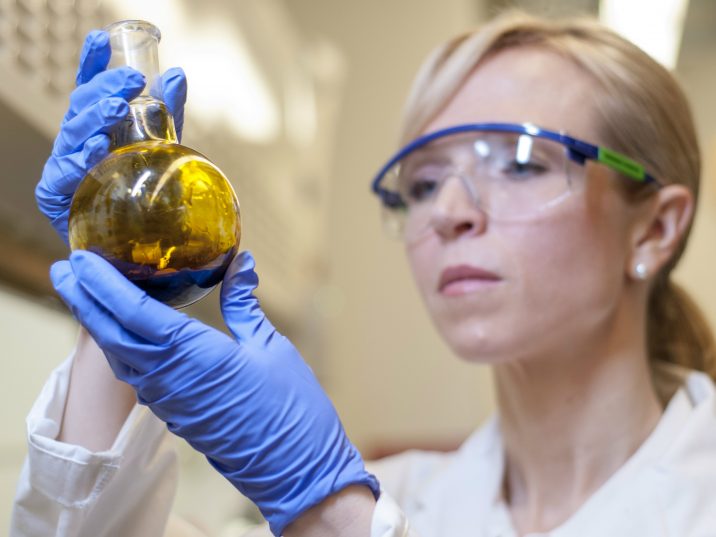You are here
Home 🌿 Cannabis Technology News 🌿 P.E.I. food lab testing cannabis, eyeing product development 🌿P.E.I. food lab testing cannabis, eyeing product development

BioFoodTech — the provincially-owned food testing and development lab in Charlottetown — is now testing cannabis.
Officials say they started a few months ago after implementing procedures and protocols around this new-to-them product.
"We're here to serve the industry in P.E.I," said Edward Charter, food and bioscience technology manager at BioFoodTech.
"And since cannabis is now a legal product and edibles as well, and we have that background of being able to test food products, we felt it was essential that we provide that service to that industry."
Previously, cannabis products would have been sent off-Island for testing. Now, cannabis oils, extracts and edibles can be tested at Bio Food Tech for microorganisms.
Officials with the lab say cannabis testing is about more than confirming the level of active ingredients — THC and CBD — it's about ensuring the product is microbiologically and chemically safe.

Edward Charter, food and bioscience technology manager at BioFoodTech, hopes that offering cannabis testing and assisting with product development will save Island cannabis companies time and money. (Jessica Doria-Brown/CBC )
"For healthy individuals, some amount of microbial contamination is relatively harmless," said Ebo Budu-Amoako, senior microbiologist and laboratory manager at the lab.
"But when we're talking about patients that are using cannabis to treat conditions, these people might have immune systems that are compromised and that makes them susceptible to illness from microbial contamination in the cannabis."
'Every speck' must be accounted for
Budu-Amoako said for scientists at BioFoodTech, working with cannabis has been a learning process with many new rules and restrictions to flollow.

BioFoodTech scientists are now testing cannabis oils, extracts for pesticides, solvents and bacteria. (Jessica Doria-Brown/CBC )
"Whatever we take out of it, we subtract from what we've received and we have to account for those figures," said Budu-Amoako.
"Any time somebody comes here to look at it, they know that every speck has been accounted for."
He said for the team at his lab, testing cannabis has meant increased safety, security, capacity and new equipment. Even the disposal of surplus cannabis products has rules around it — the product is mixed with other substances to render it unusable.
Budu-Amoako said despite the restrictions of working with cannabis, scientists at the lab have enjoyed the new challenge.
"It's very exciting," said Budu-Amoako.
Bio Good Tech product samples are placed on various surfaces to identify the presence of anything from bacteria like salmonella to traces of pesticides. (Jessica Doria-Brown)
"It's a new area and a new method of accountability that we never used to do for other products before. So everybody's learning a lot about how to be vigilant in the way things are handled."
Provincial and federal labs are exempt from licensing requirements to do basic cannabis testing. But Bio Food Tech recently acquired an additional licence, planning to expand its services to include cannabis product development — all aimed at supporting the growing cannabis industry on P.E.I.
Charter hopes this will help save Island companies time and money.
"We hope that companies having that local support will be beneficial to them as they're trying to develop their business, so they don't have to ship samples off-Island, and keep the business here," he said.
420 Intel is Your Source for Marijuana News
420 Intel Canada is your leading news source for the Canadian cannabis industry. Get the latest updates on Canadian cannabis stocks and developments on how Canada continues to be a major player in the worldwide recreational and medical cannabis industry.
420 Intel Canada is the Canadian Industry news outlet that will keep you updated on how these Canadian developments in recreational and medical marijuana will impact the country and the world. Our commitment is to bring you the most important cannabis news stories from across Canada every day of the week.
Marijuana industry news is a constant endeavor with new developments each day. For marijuana news across the True North, 420 Intel Canada promises to bring you quality, Canadian, cannabis industry news.
You can get 420 Intel news delivered directly to your inbox by signing up for our daily marijuana news, ensuring you’re always kept up to date on the ever-changing cannabis industry. To stay even better informed about marijuana legalization news follow us on Twitter, Facebook and LinkedIn.




